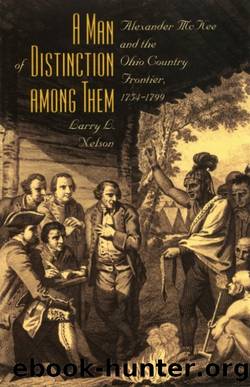A Man of Distinction Among Them by Larry L Nelson

Author:Larry L Nelson [Nelson, Larry L]
Language: eng
Format: epub
Tags: History, United States, Revolutionary Period (1775-1800)
ISBN: 9780873387002
Google: y1KekDaaKKAC
Publisher: Kent State University Press
Published: 1999-01-15T03:35:58+00:00
CHAPTER SEVEN
Land Acquisition, Public Affairs, and Politics, 1783â1799
________
Following the Revolution, McKee began the process through which he gained full membership as one of the regionâs social and civil elite. The transformation was deliberate and was accompanied by a self-conscious thirst for status, demonstrated in both his public and private affairs. Moreover, he brought about this transformation by employing the same skills he had used with the Ohio Country nations. He manipulated his control of resources and forged and then exploited ties based on family and trade. In 1783, British officials addressed the matter of rank that had so vexed McKee throughout the conflict, advancing him to the rank of colonel in the Indian department. The promotion was not the military rank that John Connolly had promised in 1777. Though organized along a military-like chain of command, the Indian department was a semiautonomous bureau that operated in cooperation with the British army. The military supplied the department with its budget, and both the army and the Indian department were under the direction of the commander in chief. The Indian department, however, was headed by its own superintendent general and operated outside the militaryâs formal command structure.1
The promotion recognized McKeeâs contributions during the war and the increase in his responsibilities following the conflict. During the war, Indian department officials at Detroit had been directed by the postâs commanding officers, Henry Hamilton and Arent DePeyster. In August 1783, DePeyster, recognizing the need to reestablish independent control of the Indian department, urged Sir John Johnson, the superintendent general, to appoint McKee as head of the department. Lieutenant governor Jehu Hay also supported McKeeâs appointment and wrote to Haldimand, describing McKee as âa very good man [who] understands the management of Indians as well as any officer in the Department.â By mid-August, DePeyster delegated full responsibility for the management of Indian affairs to McKee, who had been acting deputy agent at Detroit ever since Hayâs capture by George Rogers Clark in 1779. McKee retained this duty, greatly expanded and under a variety of administrative titles, until the end of his career. In March 1790, Lord Dorchester, describing McKee as âan old Servant universally spoken of for his merits,â named him to be Indian agent at Detroit. In March 1794, McKeeâs duties were expanded to include supervision of the department at Michilimackinac. Later that year he was appointed deputy superintendent and inspector general for Indian affairs for Upper and Lower Canada, the position that he held at his death in January 1799.2
McKeeâs visibility within the Indian department, his demonstrated administrative strengths, and his familiarity with the regionâs military affairs prepared the way for his appointment to other posts within the colonial administration. In the 1790s, as increased tensions between Great Britain and the United States threatened to expand into open warfare, British officials, fearing for the safety of Detroit, attempted to strengthen the areaâs militia. As the Indian departmentâs senior officer, McKee was named lieutenant colonel, commandant of the militia for the Detroit region in 1792.
Download
This site does not store any files on its server. We only index and link to content provided by other sites. Please contact the content providers to delete copyright contents if any and email us, we'll remove relevant links or contents immediately.
| Americas | African Americans |
| Civil War | Colonial Period |
| Immigrants | Revolution & Founding |
| State & Local |
In Cold Blood by Truman Capote(3374)
The Innovators: How a Group of Hackers, Geniuses, and Geeks Created the Digital Revolution by Walter Isaacson(3135)
Steve Jobs by Walter Isaacson(2888)
All the President's Men by Carl Bernstein & Bob Woodward(2362)
Lonely Planet New York City by Lonely Planet(2211)
And the Band Played On by Randy Shilts(2186)
The Room Where It Happened by John Bolton;(2150)
The Poisoner's Handbook by Deborah Blum(2126)
The Innovators by Walter Isaacson(2096)
The Murder of Marilyn Monroe by Jay Margolis(2091)
Lincoln by David Herbert Donald(1981)
A Colony in a Nation by Chris Hayes(1926)
Being George Washington by Beck Glenn(1899)
Under the Banner of Heaven: A Story of Violent Faith by Jon Krakauer(1788)
Amelia Earhart by Doris L. Rich(1685)
The Unsettlers by Mark Sundeen(1682)
Dirt by Bill Buford(1668)
Birdmen by Lawrence Goldstone(1660)
Zeitoun by Dave Eggers(1643)
